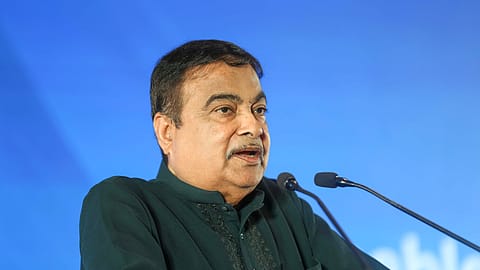EVs, hybrids to have 8% market share by 2028: Nitin Gadkari
Nitin Gadkari urges the auto industry to compete effectively with China by leveraging technology without compromising on quality.

Hybrid and electric vehicles are expected to have 8% market share in India by 2028, according to Union minister of road transport and highways Nitin Gadkari.
EV penetration stood at 6.4% in 2024. However, 56% of total EV sales came from electric two-wheelers. Government's policy think tank NITI Aayog had earlier set an ambitious 30% EV penetration target for four-wheelers and 80% for two- and three-wheelers by 2030.
Speaking virtually at the 21st EV EXPO 2024, the Union minister exhorted automakers to embrace electrification. “On one side we are power surplus, and on the other side, we are importing fossil fuel of ₹22 lakh crore,” he says.
Gadkari urged the auto industry to compete effectively with China by leveraging technology without compromising on quality. He told the gathering to seize the opportunity to expand production tenfold and position India as a global leader in the EV market. “We have to have competition with a country like China,” he says, adding that this is an appropriate time to expand factories.
India is the third-largest automobile market in volume terms after the U.S. and China. “We are going to become the number 1 auto market in five years,” Gadkari predicts.
There is a huge response from society and people at large for EVs, Gadkari says, adding that about 30 lakh EVs were registered in India in 2023-24, up 45% compared to the previous year. Around 400 startups are part of the EV ecosystem in India.
The minister says the transport industry contributes 330 million metric tonnes of CO2 emissions every year. “Our aim is to make India carbon neutral country by 2070. For that reason, the most important thing is electric scooter, car, bus, truck, tractor, and construction equipment.”
Recommended Stories
India’s electric vehicle market has a potential of ₹20 lakh crore by 2030, according to Gadkari. EVs are expected to create 5 crore jobs across entire ecosystem, he says. The EV financing market will be ₹4 lakh crore by 2030, he adds.
The Union minister says 16,000 EV charging stations have been set up and 2,800 more are in the pipeline.
Gadkari says lithium-ion reserves in Jammu & Kashmir can power 60 crore EVs. “Lithium in J&K is 6 million tonnes, 6% of the world reserve. This lithium can be used in 60 crore EVs. The government is trying to get this lithium as early as possible,” he says.
The most important thing in an electric vehicle is the lithium-ion battery. The cost of li-ion battery is $115 per kilowatt-hour currently. But Gadkari expects it to be less than $100 kWh within six months. The minister also expects Li-ion recycling market to hit ₹50,000 crore by 2030.
(INR CR)